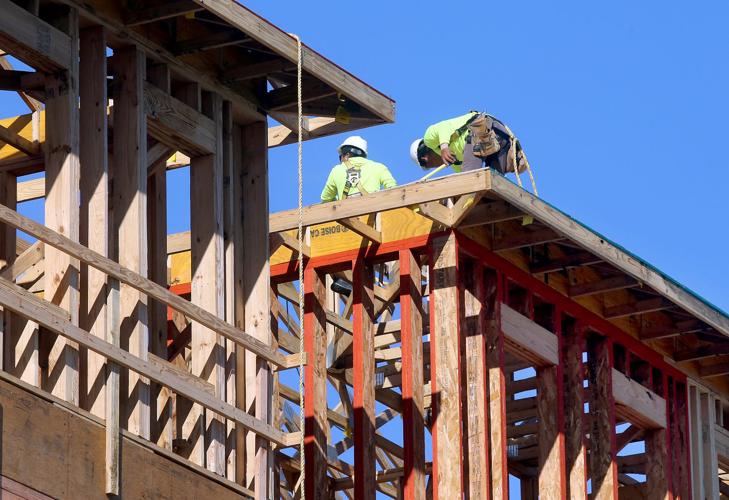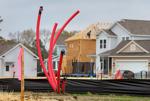Ryan King and wife Tracy bought a house last December in the blossoming Brighton Park Village neighborhood of Nexton near Summerville.
They paid roughly $400,000 for the two-story, nearly 3,000-square-foot residence with three bedrooms and a flex room. With a 4½-year-old son, the transplants from the Northeast and Midwest liked the front porches and sense of community.
"When we were looking around, everyone was so friendly and said, 'Come on over and hang out,'" Ryan recalled.
They were hooked, but Ryan said if both he and his wife were not working — he in regional pool sales and she in apartment management — they could not afford the house.
In North Charleston Chris Howell found the house he wanted two years ago in the Park Circle area.
But without an inheritance for the 15 percent down payment and two roommates to help him make payments on the $280,000 house, he said he most likely would still be renting because he otherwise couldn't afford it.
Three years ago, Jeff Gruber bought a house in West Ashley after being transferred for work from Virginia.
He found one that needed work for about $207,000, but he would have liked to have had more options to choose from in that price range.
Growing gap
Living in Charleston is costly. New homes at the lower end of the price range are hard to come by because land prices are high, and builders aren't overbuilding so they won't get stuck with unsold houses if the economy sours.
Finding an affordable house isn't easy, and more than half of the households in the region pay more for housing than the federal standard of 30 percent of their incomes.

A new home rises in the Nexton community of Berkeley County, about 25 miles from downtown Charleston. More affordable housing can be found farther from the region's central core as home prices continue to escalate and housing permits are limited by municipalities such as Mount Pleasant. Warren L. Wise/Staff
It's a growing gap, as home prices and wages don't match up, exacerbating the housing-affordability crisis.
"When you look at affordability, over 53 percent of the folks in the metro area are spending more on housing than they should be," said Edward Oswald, president of the Charleston Trident Association of Realtors. "That's an unsustainable trend."
An even wider divide exists between Lowcountry housing industry leaders, elected officials and the solutions needed to get younger, entry-level workers into residences they can afford closer to where they work.
"We feel like we are creating a situation here where housing is unattainable for people entering the housing market," Oswald said.
No one has a silver bullet, but suggested solutions could require higher wages, greater density, subsidizing land costs, less-restrictive government policies, faster permitting times and a meeting of the minds.
'Consequences to inaction'
In recent months, housing leaders have elevated the discourse, taking aim at moratoriums, regulatory red tape and policies that restrict development.
“You can’t just turn off the faucet," Oswald said. "That’s not how it works. There are consequences to inaction. Residents are struggling with longer commute times, failing infrastructure and housing they can’t afford."
He believes it would help to gather representatives from all sides to hash out their differences, find common ground and come up with solutions.
“Our region is growing, but we’re not growing smart right now," Oswald said. "We’re not comfortable with the idea of density, we have a real lack of planning and it seems that there’s a conscious effort to delay development. We’re simply not meeting the housing needs of our region.”
About 7,500 new housing units are needed each year to meet the demands of housing for people choosing to remain in Charleston and those moving to the metro area, according to Ian Scott of the Charleston Metro Chamber of Commerce.
"We need more housing supply and more diversity in the supply we are seeing," Scott said. "It's not a silver bullet, but we won't solve the problem without more supply. ... We are adding more new households than we are adding new units, and we have been since 2006."
But he said simply building more of anything is not the answer.
"It has to be in the right places and at the right prices," Scott said.
He pointed to more efficient use of land — also known as higher density — that includes cluster homes, apartments and single-family units on high-and-dry land with nearby transportation alternatives.
"We would love to see more mixed-use development closer in," Scott said. "But we have made it harder rather than easier (to offer housing solutions)."
For many, he said density is a four-letter word, but in the right places, it makes sense.
In the city of Charleston, density is encouraged on the upper peninsula where multiple new multistory apartment projects are in the works.
Mixed in with that will be affordable housing developments, paid for from a voter-approved borrowing measure, developers' credits and other funds.
"You don't want affordable housing concentrated in any given area," city planning director Jacob Lindsey said. "You want to mix it up."

Oyster Park off Ben Sawyer Boulevard in Mount Pleasant is a mix of apartments and retail space, but Mayor Will Haynie said most of the shops remain vacant in the development promised as a live-work-shop community. Brad Nettles/Staff
In Mount Pleasant, where housing permits are limited, heights are restricted and development fees are high, Mayor Will Haynie said density isn't working and residents have rejected it at the polls.
Haynie said the town has tried the "live-work" approach and it hasn't worked. He pointed to Oyster Park, a mixed-use apartment and retail development off Ben Sawyer Boulevard, where he said most of the stores sit empty.
"We are not seeing people abandoning their cars, and we are not seeing high density — where it has been tried in Mount Pleasant — getting the results that these same groups have been promising," Haynie said.
A real estate representative of Oyster Park conceded more retail activity is needed and said more shops are in the works. Two new ones were announced in October.
Higher pay
Raising wages is a common response from leaders to ease the region's high-priced housing woes, but that's easier said than done.
The mayors of North Charleston and Summerville and a College of Charleston real estate professor agree employers must begin boosting salaries to keep younger workers from looking at other markets where housing is less expensive.

The Grace Homes affordable housing project continues to rise off Meeting Street where the former Cooper River Bridge touched down on the Charleston peninsula. Brad Nettles/Staff
In North Charleston, the city raised pay for its lowest paid employee to $15 an hour.
"It's hard for me to ask businesses to do the same thing if the city doesn't lead by example," Mayor Keith Summey said.
Some firms in the region require a master's degree but then offer employees a starting salary they can barely afford to live on, said Elaine Worzala of the College of Charleston.
"They get away with it because people want to live here," she said.
Because of the influx of higher-paying companies such as Boeing, Mercedes-Benz and Volvo, Worzala said wages have grown somewhat in the region, but they haven't kept up with home prices.
While some believe raising wages will cut into the number of employees at a firm to make the numbers work, Worzala said people earning more will have more money to spend, creating more jobs in the overall economy.
The affordability issue is important for the chamber as it tries to sell the region to companies looking to locate in Charleston and retain the ones already in the region.
"Workers need to be able to afford a place to live in and be able to live closer to where they work," Scott said. "We lose a significant chunk of skilled workers every year to other regions of the Southeast. We draw people in from other metro markets in their 20s and lose them in their 30s. A lot of it has to do with housing supplies."
In Summerville, the amount of income spent on housing is just above the 30 percent threshold, so the city that lies 25 miles west of Charleston is still relatively affordable for homeowners.
Outgoing Mayor Wiley Johnson, who did not run for reelection last week, said keeping income and housing expenses in line will require more effort to attract higher-paying jobs.
"Our commercial and industrial development has not kept up with our housing development," Johnson said. "As a result, we don't have enough affordable housing.
Oswald cited the median home price in the Charleston area of nearly $285,000 this year while in Greenville it's $195,000.
"Everybody wants to live in Charleston, but sometimes it's hard to do that and people can live somewhere else a lot cheaper," Oswald said.
The gap
In Charleston County, home to three of the state's four largest municipalities — No. 1 Charleston, No. 3 North Charleston and No. 4 Mount Pleasant — the median household income is about $58,000, according to the most recent U.S. Census estimates from 2017.
The median monthly mortgage came in at about $1,650, or $19,800 a year, meaning more than 34 percent of income goes toward housing on average in Charleston County.
The divide is more pronounced in Charleston and North Charleston than in the bedroom communities of Mount Pleasant, Goose Creek and Summerville, where either higher incomes in Mount Pleasant or lower home prices in the other suburbs equal 30 percent or less of income spent on housing.
Unlike Mount Pleasant, Charleston does not use building permit quotas, but it has instituted temporary construction moratoriums, mainly tied to drainage issues.
"They are passed as a stopgap measure while rules are revised," said Lindsey, the city's planning chief. "The purpose is not to drain the supply of housing. The purpose is to correct the problem."
In Mount Pleasant, the mayor pointed to the strain that increased housing development puts on public resources, causing calls for services to rise exponentially and requiring more revenue than it generates.
"We are stewards of public service," Haynie said. "We are not stewards of the housing market."
Looking for solutions
In North Charleston, Summey would like to work with the housing authority to see if there is a way for the agency to use federal funds to buy some of the boarded-up houses in more impoverished areas. The city could then buy them and market them at below-market value to entice residents to move in.
"It's a task," Summey conceded in trying to bridge the gap between where people can afford to live and what they earn. "We are trying to improve the neighborhoods by engaging residents and improving the schools in those areas without displacing the longtime residents there."
He added that North Charleston has never had a moratorium on construction, largely because of the space for infill development that was left after the Navy base closed in 1996.

Construction crews continue to work on the affordable housing project Grace Homes off Meeting Street on the Charleston peninsula. Brad Nettles/Staff
"The more infill we get, the less through-traffic we will have because they will live closer to where they work," Summey said.
Worzala of the College of Charleston doesn't think moratoriums are effective because they restrict supply, causing prices to escalate.
"Developers and city planners should be watching the pulse of the market and follow suit," she said.
Other options, she said, are to figure out a way to subsidize Charleston's rising land prices or somehow convince developers to build lower-cost housing instead with lower profit margins.
"You now drive till you qualify," she said, referring to buyers who are looking for a home they can afford. "The jobs aren't where the lower-priced housing is."

















